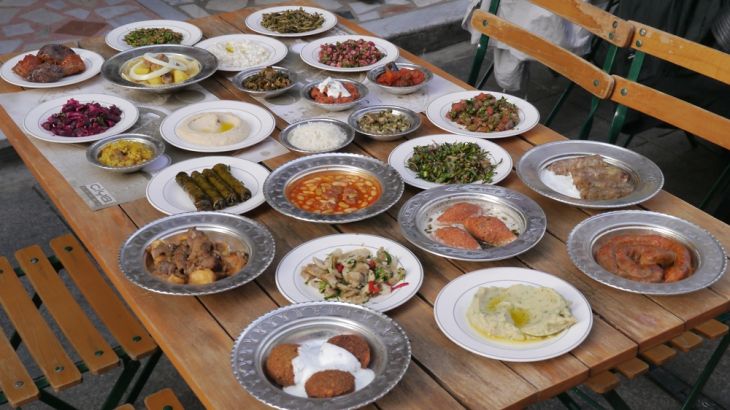
Istanbul: Turkish cuisine at a crossroads
We explore how a new generation is keeping Turkey’s centuries-old culinary traditions alive in a modern world.
Istanbul sits at the point of intersection between Europe and Asia and its food has been heavily influenced by its rich history and traditions: the palace food from the Ottoman times, the Armenian and Greek influences and that from Anatolia.
Although Istanbul is often visited for its past, it’s very much a modern metropolis. In a buzzing city with 14 million inhabitants, the food scene is also booming.
Keep reading
list of 4 itemsFire engulfs iconic stock exchange building in Denmark’s Copenhagen
Inside the pressures facing Quebec’s billion-dollar maple syrup industry
‘Accepted in both [worlds]’: Indonesia’s Chinese Muslims prepare for Eid
Twenty-five percent of the city’s population is employed one way or another in the food business and many young people are creating opportunities for themselves from its rich gastronomic history.
AJEats finds out how food became such a strong part of the culture, and what the future holds for Istanbul’s food lovers in a world of fast food and mass production.
PRESENTER’S VIEW
By Gerald Tan
Turkish cuisine was once described to me as the original fusion food. It instantly made sense. How often do we hear that Turkey’s commercial hub, Istanbul, is the only city occupying two continents, the point where Europe and Asia embrace. It would follow, then, that their culinary influences would be prevalent in Turkey.
Indeed, geography plays a role. The original settlers were nomadic Turkic tribes who left the steppes between the Ural and Altay mountains, migrating towards Central Asia, the Balkans, and finally Anatolia. They brought the elements and practices they picked up along the way, including the food.
But there’s a much deeper story. Istanbul was also the seat of not one but four empires. It was during the 600-year reign of the Ottomans that Turkish cuisine as we know it began to crystallise. The sultans were quite simply obsessed with food. Archives dating back to the 15th century detail with great accuracy the kind of feasts served to the royal family, the court, and dignitaries from across the land.
Visiting the imperial kitchen at Topkapi Palace can be bewildering for any food lover. The sheer size of the industrial-sized chimney stacks is an indication of how much activity took place. Cooks from across the empire vied to get in, hoping to catch the attention of the sultan through their cooking.
It was this spirit of competition and creativity that gave birth to thousands of dishes, such as hunkar begendi (stewed lamb with eggplant puree) and mahmudiye (chicken with dried fruit), and propelled Turkish cuisine to be classed as one of the world’s three grand cuisines, alongside French and Chinese, a distinction based solely on variety.
Today, it’s the youth determining Turkey’s gastronomic future. I dined with Korhan Karakoyun, a licensed guide who went through rigorous tests on his country’s history and now conducts food tours, where he introduces visitors to traditional Turkish dishes and those preparing them in the old ways. I got to cook with the popular TV chef Refika Birgul, who has made a name for herself adapting ancient recipes to suit modern lifestyles. And I met the Demirhan brothers, entrepreneurs tapping into the growing demand for home-cooked flavours delivered to the doorstep.
All of them are part of a generation not only defining themselves through food but also furiously trying to keep traditions of the Turkish kitchen alive.
THE PEOPLE SHAPING TURKEY’S CULINARY FUTURE
Refika Birgul, the celebrity chef
![Refika Birgul [Al Jazeera]](/wp-content/uploads/2015/12/e0ea51481f304bcdb4758e289b60e64c_18.jpeg)
Twitter: @refikabirgul
Refika blushes when she’s called a celebrity chef, but there is no better way to describe this humble TV personality.
She is the host of a nationally broadcast cooking show called Mucize Lezzetler (filmed in her kitchen) and the author of the cookbook, Refika’nin Mutfagi. Her recipes are rooted in classic Turkish flavours but adapted to suit a modern lifestyle – typically healthier and quicker to prepare.
Korhan & Leisa Karakoyun, the food tour guide
![Korhan & Leisa Karakoyun [Al Jazeera]](/wp-content/uploads/2015/12/de3b778b9250421fade99b44ebd759c4_18.jpeg)
www.facebook.com/Istanbulfoodtours/
For those who enjoy eating their way through a city, Korhan is the guy to know in Istanbul. He and his wife Leisa host food tours, taking visitors to places where iconic Turkish dishes are prepared using ancestral methods.
All tour guides in Turkey go through rigorous training from the Ministry of Culture and Tourism, but Korhan’s genuine love for food makes it an even more memorable experience.
Murat & Bulent Demirhan, the entrepreneurs
![Murat & Bulent Demirhan [Al Jazeera]](/wp-content/uploads/2015/12/67c41145c86942a8b9991f2bc0e74f5c_18.jpeg)
Twitter: @_MuratDemirhan_
Murat & Bulent are a dynamic duo. In less than two years, the brothers turned an idea of delivering home-style Turkish cooking into a mini fast-food empire.
Their company, Meal Box, started with just one shop and a website; today they have more than 100 people working for them. With the help of mobile technology, Meal Box has cornered a growing market built on convenience and culinary nostalgia.
Follow Gerald Tan on Twitter: @GeraldoTan & Instagram: @boulangerry